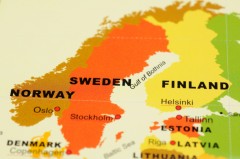
by Russ Koesterich, Portfolio Manager, iShares
Call #1: An Update on Europe & Overweight Norway
While there have been developments toward solving the European debt crisis in recent months, more needs to be done.
Funding costs for Italy and Spain remain high, particularly for Italy. It also looks more likely that at some point in the next year or two Greece will need to default and potentially leave the euro zone. Europe also has yet to definitively address the fiscal and growth problems in the peripheral countries.
With the European crisis dragging on and Europe likely to experience at least a mild recession this year, stocks in the region have become very cheap — the Euro Stoxx Index is trading at 8.3 next year’s earnings. I still, however, continue to be cautious on the region overall and advocate avoiding large parts of Europe – particularly Spain and Italy. These markets are cheap for a reason.
Still, I do like some countries in the economically stable northern region of the continent. Much of Northern Europe arguably represents a good value for long-term investors when you consider these countries’ current valuations, growth prospects and perceived risk. I’m reiterating my overweight views of Germany and the Netherlands, and I’m also now advocating an overweight position in Norwegian equities.
From a valuation perspective, you can buy global large caps in Northern Europe for virtually the same price as the more fundamentally challenged companies in southern Europe. Stocks in Germany’s DAX index, for instance, currently trade at less than 9x next year’s earnings, while equities in Norway and in the Netherlands are trading at just 8.5x next year’s earnings.
Meanwhile, countries in Northern Europe, particularly the Nordic countries, are generally expected to grow faster than other developed markets. Based on International Monetary Fund forecasts, Sweden, Finland and Norway should post economic growth this year well above the developed market average.
Finally, based on current credit default swap spreads, these countries are perceived as less risky than the problem children further to the south. This is largely due to Northern Europe’s very modest debt burdens (potential iShares solutions: EWG, EWN).
Source: Bloomberg
Disclosure: Author is long EWG and EWN.
International investments may involve risk of capital loss from unfavorable fluctuation in currency values, from differences in generally accepted accounting principles or from economic or political instability in other nations. Securities focusing on a single country may be subject to higher volatility.










